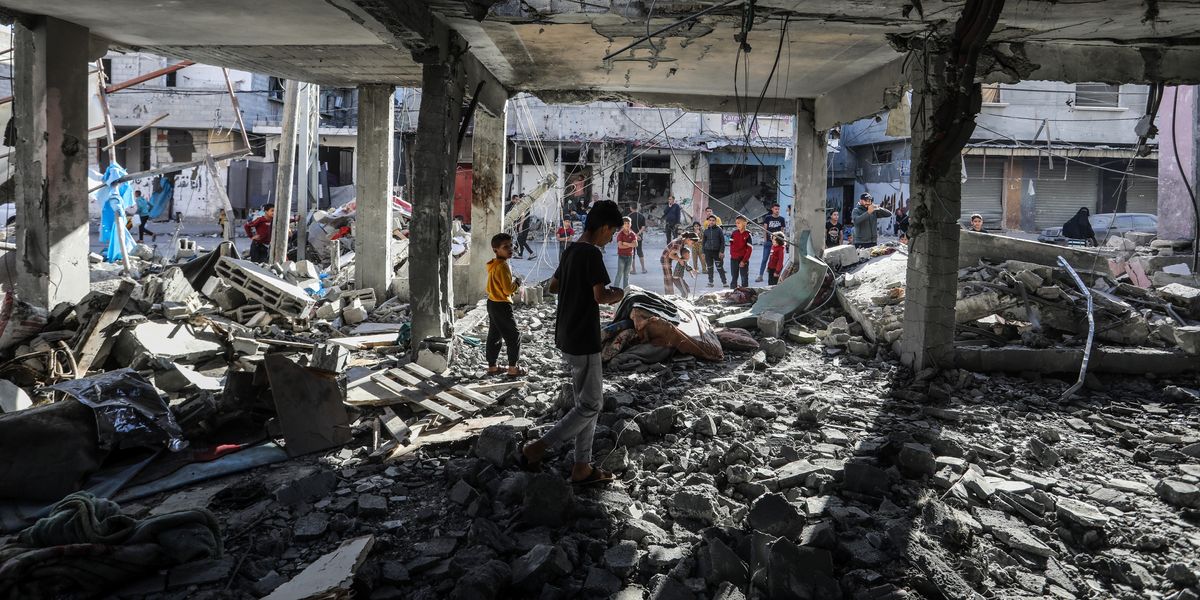In light of Iran and Israel’s recent retaliatory strikes, media focus has now turned to concerns of potential regional escalation and the awaited aid package from the U.S. House of Representatives. Gaza and the war there appear to have moved off to sidebar status as a result.
It shouldn’t remain there for long. While the world’s gaze has been turned, the death toll of 50 to 100 Gazans a day since the Israeli strike on the Iranian consulate in Syria only underscores the ongoing severity of the situation. Since the April 1 attack, the Israeli onslaught on Gaza has bred: revelations that the Israeli Defense Forces (IDF) created “kill zones” in Gaza in which anyone can be shot; the deaths of seven international aid workers, who were killed in a targeted attack by the Israeli military; a mass grave found after the Israeli withdrawal from al-Shifa hospital that held at least fifteen bodies after the two week siege on the hospital; the deaths of at least 13 people after a strike targeted Al-Maghazi refugee camp in central Gaza; and news that all of Gaza City’s water wells had stopped functioning, according to Gaza’s Government Media Office.
In the U.S., grassroots efforts to halt arms sales to Israel have not ceased either. The uncommitted national campaign in the Democratic presidential primary has brought in nearly half a million dollars to finance the effort, which aims to push the Biden administration towards a ceasefire in Gaza. The movement started in Michigan’s democratic presidential primary, where more than 100,000 voters cast ballots for “uncommitted” — sending a signal to the president’s reelection campaign that he is out of step with his likely voters on the war in Gaza. Since then, other states — such as Minnesota, Washington and Wisconsin — picked up the idea and rapidly organized to turn out people who wanted to send Biden a message. On Tax Day this year, protests took place across the country to raise awareness about Israel’s war in Gaza.
In Israel, massive protests continue in Tel Aviv and Jerusalem, reflecting a significant challenge to Prime Minister Benjamin Netanyahu's increasingly embattled leadership. Demonstrators are furious with the prime minister and his government for failing to secure the release of all hostages taken during the events of October 7. Despite the release of 105 individuals during a temporary truce last year, 130 hostages remain either deceased or in captivity with Hamas and other militant groups. Banners at the protests demand Netanyahu's resignation and call for new nationwide elections.
As of Friday, the House of Representatives was poised to advance the National Security Supplemental, including $16 billion in aid for Israel. In their negotiations with Republicans, Democratic leadership held the inclusion of Gaza aid in any package as a “red line.” Despite this, there is still a large segment of the Democratic party that does not support sending offensive weapons to Israel without assurances that its use will not violate any U.S. laws or international laws related to war. House Foreign Affairs Committee Ranking Member Gregory Meeks has so far declined to give his sign-off on a sale of F-15s to Israel.
Additionally, in the midst of the procedural hurdles in passing the foreign aid packages out of the House, eight Democrats introduced an amendment that would restrict U.S. weapons transfers to Israel until a "full investigation" is completed into their use in Gaza. The amendment was blocked by the Rules Committee. This was just one of many amendments from Democrats that were critical of Israel's actions that were not ultimately made in order by the committee. The final vote of the Israel military aid bill, along with the others in the package, is slated for Saturday morning.
Israel finds itself in a precarious position, also engaged in a separate conflict with Hezbollah on its northern border while pledging to respond to Iran's strikes last week. However, Israel is absolutely taking advantage of the world’s diverted attention. Recent discussions between the Biden administration and Israeli officials suggest some form of approval for a ground invasion in Rafah is still to come.
In the entirety of Gaza, from the dire famine in the north to the desperation of refugees now packed into the densely populated south, the upcoming days and weeks will be critical. It's essential to remember that at the root of both the Israeli and Iranian strikes lies the failure of Israel and Hamas to reach a ceasefire there. To this end, the world’s attention should not waver.
- History shows Israel may never win a 'war of occupation' ›
- Is the Gaza war destabilizing Jordan? ›
- Will US troops be drawn into the Israel-Gaza war? ›
- Is 24/7 protest coverage distracting from the real war, in Gaza? | Responsible Statecraft ›
- The US gives Israel $1.2B for giant laser beam weapon | Responsible Statecraft ›
- Dear Joe Biden: A message on Rafah from US military families | Responsible Statecraft ›















